El Chipote, the dungeon for Nicaragua’s political prisoners
Daniel Ortega was sworn in for a fourth consecutive term this week after an election held in the absence of any major political rivals. Dozens of opposition figures are detained in a prison that is the most notorious symbol of the regime’s repression and human rights abuses


After 210 days spent in Nicaragua’s most notorious prison, 70-year-old Violeta Granera has lost several teeth because the meager food she is given is so hard. The opposition leader’s face is covered with red spots due to a lack of sunlight, and the cold makes her captivity even harder. On the concrete slab that serves as a bed, no sheets and no blanket are to be found.
Welcome to El Chipote, a prison officially known by the bland bureaucratic title of Dirección de Auxilio Judicial (DAJ), but in reality a hellish place where opponents of Nicaragua’s president Daniel Ortega are kept sealed off from society. The jail holds 36 of Nicaragua’s main opposition figures. Relatives who have managed to visit report rampant malnutrition, ill-treatment and severely restricted access to their lawyers.
Ortega, the “supreme leader” who gave the orders to arrest them all, began his fourth term as president of Nicaragua this week, following an election marked by the absence of figures like Granera. Instead, the guards mock political prisoners like her and Roger Reyes, a lawyer who was critical of Ortega and of his wife and “co-president,” Rosario Murillo.
Held in solitary confinement since November 22, 2021, Reyes now measures out life in a cell measuring two meters long by two meters wide, with a hole in the ceiling. “I am losing my memory,” the political prisoner told his wife during an unprecedented visit authorized this New Year, a concession announced after the political activist Ana Margarita Vijil publicly denounced her own mistreatment. Vijil, who is naturally slender, is so skinny that she asked relatives for children’s glasses because hers were falling off her face.
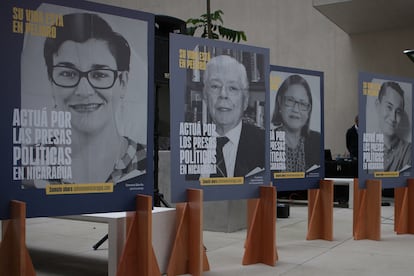
Reyes is wracked by depression and anxiety, according to his family. His crime? Affiliation with the opposition National Blue and White Unity party (UNAB), and defending Félix Madariaga, one of seven potential presidential candidates imprisoned since June 2021. That summer, Ortega hunted down 46 opposition leaders to eliminate all competition in the general elections of November 7. Ortega and Murillo declared themselves the winners of the elections, which were marked by the overwhelming figure of 85% who abstained from voting, according to the organization Urnas Abiertas [Open Ballot Boxes].
The family visits this month allowed relatives to see political prisoners emaciated by up to 80 days in the prison, overmedicated and exhausted by perpetual interrogations. “They look like they came out of concentration camps,” the relatives said in a joint statement. Former parliamentary deputy Jose Pallais, 68, has lost 90 pounds (41 kilos), according to reports. He is so weak that he has fainted on two occasions, and has sores and abscesses on his back because the guards removed the mat he was sleeping on. Pallais suffers from diabetes, and has been sleeping in a chair for a couple of months that his relatives brought him because of sleep apnea.
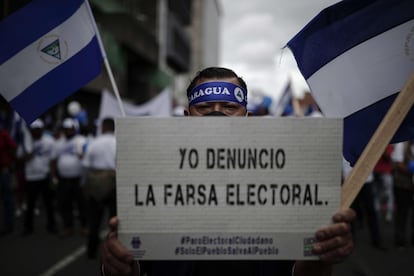
Like him, 12 of the 36 political prisoners in El Chipote are elderly, and their pre-existing and chronic illnesses have spiraled out of control due to the lack of medical attention. The former ambassador to the Organization of American States (OAS) Edgar Parrales, 79, lacks a large intestine and has lost 12 pounds (5.4 kilos) in 40 days.
El Chipote has become the presidential couple’s darkest dungeon, and a cornerstone of the repression that has propelled Ortega to a fourth term. In recent public statements, Ortega and Murillo attempted to justify the treatment of their opponents. They use the term “coup plotters,” which they have invoked since the 2018 protests that threatened their grip on power, and have also called the detainees “stateless.” “They should be taken to the United States, they are not Nicaraguans, they are no longer Nicaraguans. They have no homeland,” Ortega said on November 8, a day after the disputed elections.
One of the ex-guerrilla fighters of Sandinismo, the left-wing populist movement that brought Ortega to power, is retired general Hugo Torres, 73. He was taken from El Chipote to a hospital in Managua in mid-December “in a delicate condition.” Torres, together with former guerrilla Dora María Téllez, led the near-mythical assault on the Somoza palace in 1978, helping to bring nearly five decades of dictatorship to an end in Nicaragua. Téllez is the strongest physically and emotionally of her old Sandinista comrades, according to relatives of these prisoners. She exercises, but is very thin in solitary confinement, as the guards do not allow family members to pass food to the political prisoners.
Some elderly detainees ask for Ensure (a liquid food supplement) to alleviate hunger. Political prisoners of different ideologies and backgrounds who are not in solitary confinement share it when they manage to get hold of it. This exchange is conducted in silence, according to their families, because the guards shout threats to prevent them from communicating with each other. In El Chipote, businessmen share cells with former Sandinista guerrillas, and right-wing politicians rub shoulders with activists who agitated for feminism and social democracy. All became Ortega’s enemies under his rule.
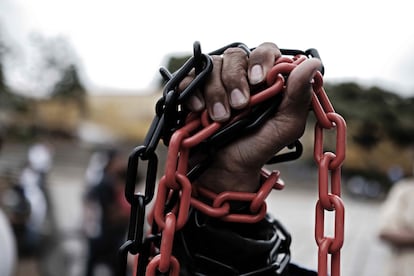
A possible prisoner release tied to Ortega’s swearing-in ceremony seems a remote possibility, as the regime is increasingly internationally isolated amid its growing radicalization. Spain was the first to announce that it would not send anyone to the inauguration in Managua. Mexico, which had confirmed the presence of its representatives, announced on Sunday night that “no official from the Mexican Foreign Ministry would attend.”
Women targeted
The relatives of the political prisoners have denounced that women are singled out for extra persecution. The activists Támara Dávila and Suyén Barahona are held in isolation and guards repeatedly tell them that they are “bad mothers” for abandoning their children to protest against the government.
Mothers and wives of political prisoners also suffer harassment during visits to El Chipote. This includes “touching, and removal of clothing and underwear.” Ana Chamorro de Holmann, who is 94 years old, visited her son Juan Lorenzo Holmann, general manager of the newspaper La Prensa. The guards forced her to pull down her pants and remove her bra. Despite this invasive search, she complied and found her son suffering from incipient blindness and heart problems. Some political prisoners are kept in brightly lit cells 24 hours a day, while others live in semi-darkness. Visits are always watched by police officers, who are also accused of taking photos and videos of the meetings without their consent.
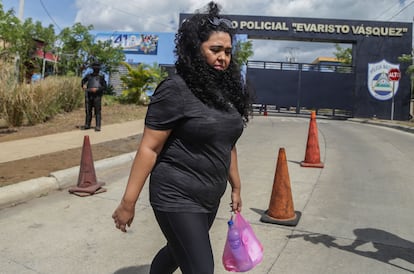
The lawyers of the political prisoners cannot offer any effective defense, not only because they have almost no access to their clients, but also because their prosecution for treason, money laundering or cybercrimes fall under laws tailor-made by the pro-Ortega National Assembly to criminalize the opposition. “The objective is to keep them invisible and defenseless,” said the relatives of the detainees in a statement. “Interrogations continue in the absence of lawyers and all petitions filed are denied or not resolved. Due process has not been respected and the proceedings have been suspended de facto, citing workload, vacations or force majeure decisions of the judges,” the statement added.
The first trial hearings were held in El Chipote itself, and defense attorneys were not even given case files. “We reaffirm our deep concern for the conditions in which they are being held and which are causing irreversible physical and psychological damage,” the relatives’ statement said. Some prefer not to denounce the government publicly so as not to lose the few concessions that the guards admit, such as allowing water bottles to enter the prison.
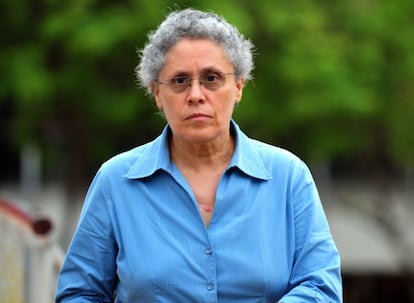
The president of the Nicaraguan Center for Human Rights, Vilma Nuñez, said the prison could only be described as a “torture center” after hearing the stories of the prisoners’ relatives. “There is a macabre spectacle inside El Chipote so that the prisoners will collapse and those of us who are outside, the companions and relatives, will collapse with them,” emphasized Núñez.
Lesther Alemán, the student leader who at barely 20 years old faced down Ortega and asked him to “surrender” in a 2018 national dialogue, could not even stand on his feet at his trial hearing. Disoriented, he said: “I’m hungry.” Alemán suffers from malnutrition and limps inside El Chipote, while his captor celebrates “a new mandate of the people’s president”, as his wife Rosario Murillo described his inauguration.